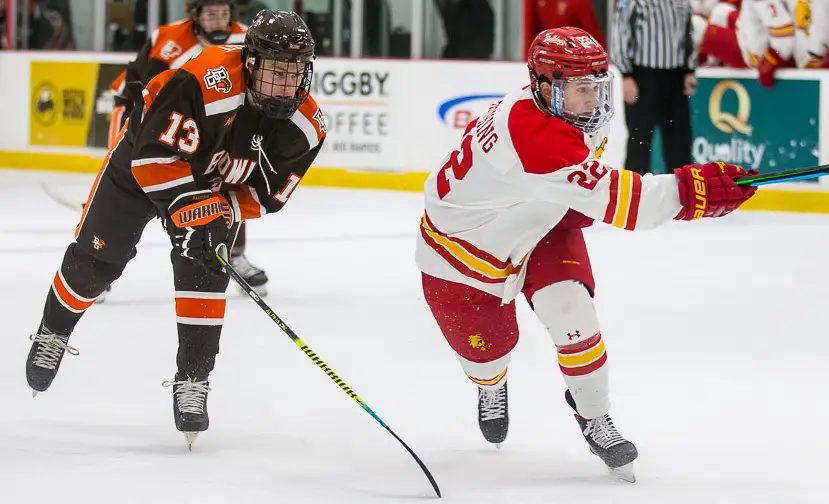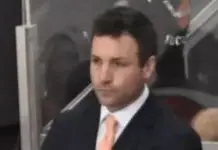
It is natural to assume that college hockey coaches are cordial, especially when they share the same conference.
It would also be very normal to assume that coaches in a given conference actually despise each other, given that they are often in competition for the same potential student-athlete, whether to an incoming freshman or a transfer student.
What is happening in the WCHA in its final season in its current iteration is a microcosm of what seems to be happening throughout college hockey.
The 2020-21 season has been unlike any other. Schools that have been traditional powers out east are not competing. A higher-than-normal number of schools in the Midwest are nationally ranked. Western powers have stumbled and recovered.
Throughout all of it, one unexpected issue has risen to the top, scheduling is hard. Hockey East eventually gave up and went to a week-by-week approach. In the WCHA, schools have had to drop games, contact neighboring schools, and cobble together a sleight of games that looks very different from normal. Teams have played games on Tuesdays, Wednesdays, and even Thursdays, just to get all their conference games in.
At the end of the day, nearly every coach in the conference has stated that all the turmoil has actually brought them closer together than ever before. The reasoning seems to be quite simple, to give players the best experience possible.
“The reality is, I think, more than ever, as I talk to other coaches, the important thing is, let’s give these kids a really good experience,” said Ferris State coach Bob Daniels. “They’re going through a lot and wins are wins, the record is gonna take care of itself, but let’s make sure it’s a positive experience.”
Daniels is in his 29th season at Ferris State. While he has never seen anything quite like this season, he has been impressed with how his fellow coaches have rolled with whatever the season has thrown their way.
He shared a story about a situation in late January, where Michigan Tech went into COVID protocols and were unable to play. Daniels was impressed with how quickly Huskies coach Joe Shawhan got the word to him, so that he could try to find another opponent on short notice. Daniels set up a game against Trine, which gave both teams the chance to play.
“We heard right away from Michigan Tech that, hey, they weren’t going to be available to play,” Daniels said. “I was very appreciative that Joe Shawhan reached out as soon as he did. It gave us the opportunity to call Trine then. We were scouring anybody in our area because you don’t want someone to travel far. We don’t want to travel far.
“We are looking for someone that could come to us and back in the same day. We saw the opening, we made a call and within 24 hours, we had that put together this week, when it was looking very dicey for us to be able to play.”
From there, Daniels ran into a situation with his own team about whether or not they would be able to play against Minnesota State the following weekend. Mavericks coach Mike Hastings proved very accommodating to the situation Daniels found himself in as team testing took longer than expected.
“I got on the phone with Mike Hastings. Mike was unbelievably accommodating moving the series to Saturday, suddenly,” said Daniels. “It was the only chance we had (to get the series in).”
Daniels feels that this season has truly been special because of interactions like the ones he described.
“Hockey’s always been great, the community in terms of working together, but I’ve never seen it come together like it has this year. I’ve gotten to know the coaches better than I ever have before. We’ve had weekly Zooms since April (2020), in terms of trying to iron out details of play. Truthfully, I’ve never seen it so collegial.
“It’s always been great, but it’s gone up a notch. My appreciation for all the other coaches, certainly within our conference has gone up immensely, too.”
In an interview in early February, Northern Michigan coach Grant Potulny echoed a lot of Daniels’ sentiments.
“With the amount of issues that need to be dealt with, probably since the beginning of this season, there’s been more, inner coaching conversations,” he said. “There’s been more Zoom calls. Maybe you know a couple of the guys better than the other guys, but (you) get a chance to really understand who those coaches are as people and understand, now, what their teams are going through.”
Perhaps the most important thing for individual coaches to remember is that they are not alone, especially this season.
“We’ve all gone through the same thing, so we can understand it,” said Potulny. “One team is supposed to play, and they get COVID, or their opponent gets COVID, there’s been schedule flips in hours instead of days.
“I do think there’s been a collaborative effort to do what’s right for the game.”
An example from Potulny’s experience actually involves both of the other two Upper Peninsula rivals in Michigan Tech and Lake Superior State. As the Huskies were readying to come off of their COVID break, the Lakers suddenly had to take one of their own. Also, Alabama Huntsville ran into COVID issues of their own, just as the Wildcats were in the process of leaving Marquette, Michigan, heading south when things changed rapidly.
“I was talking with Lake State’s Damon (Whitten), because they were the team that did not have any worries to that point,” Potulny recalled. “Michigan Tech was coming out of their COVID pause, and they felt like they were gonna play, but they just weren’t sure.
“So it’s interesting. You go from thinking you’re supposed to play Alabama Huntsville, and on your way down, that gets canceled, you turn around and come home, and then you think that you might be playing Lake Superior State. You end up playing Michigan Tech. So those are just kind of the way of the year for us, as a group. I think there’s been lots of teams that have found ways to add games and give their players the most opportunity to compete that they can.”
Shawhan expressed his thanks to Potulny for being willing to travel up to Houghton to play on that Saturday, Jan. 23, and follow up with a game at the Berry Events Center on Monday, Jan. 25. Prior to that series, the Huskies were looking to help a team out, but it did not quite work out for everyone involved.
“A little while back, right when we were coming out of COVID, we had the same opportunity, and we weren’t able to get games in with a team,” Shawhan said. “They scheduled around us.”
One issue that coaches have been trying to manage all season, while dealing with their lineups, injuries and their players’ class loads, has been their players’ mental health. By finding ways to work with other coaches in order to fit games in, coaches in the WCHA have felt that they have found a way to combat mental health issues.
“We were on a two-week break, came back, played a series, and then went on another two-week break,” said Shawhan. “Getting those games in is important. It weighs on the guys, not being able to play.”
WCHA coaches have found ways to work together to solve problems throughout the season, and that has allowed every team to play a 14-game conference schedule along with a strong non-conference slate against teams, for the most part, within the conference.
Across the board, the coaches have been appreciative of how everyone has chipped in to make the season successful.
Crespi helps the Huskies make it six
Ask any coach, it is hard to win four games against a single opponent in a season. It is even harder to win six. Usually, those last two come in a playoff format. For the Huskies, beating their UP-rival Wildcats for the fifth and sixth time this weekend was not easy.
On Friday, sophomore winger Jake Crespi scored a key shorthanded goal in the late stages of the second period to extend the Huskies’ lead to 4-1 en route to a 6-1 victory.
Shawhan has been happy with Crespi’s development as he continues to grow into his role.
“Being able to use him on the penalty kill now says a lot about his growth as a player,” Shawhan said. “That means he is defending well for us.”
Crespi followed up his goal on Friday with the game-winner on Saturday in overtime, winning the game 3-2.
“Crespi gets another big goal for us,” said Shawhan after the game. “He’s a talented young man that keeps growing for us.”


